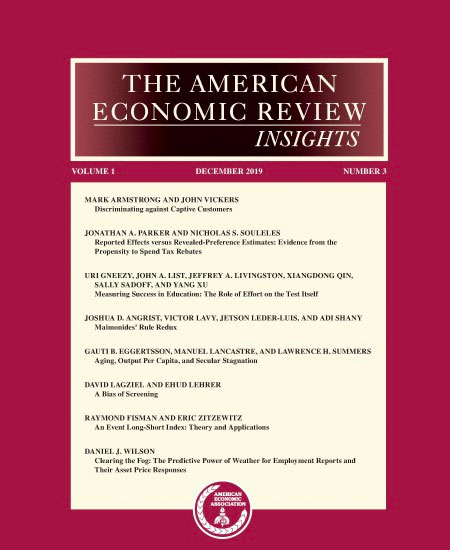歧视被俘虏的客户
IF 6.7
1区 经济学
Q1 ECONOMICS
引用次数: 47
摘要
我们分析这样一个市场,其中一些消费者只考虑从一个特定的卖家那里购买,而另一些消费者则从几个卖家中选择最优惠的交易。当销售者能够歧视他们的俘虏顾客时,我们表明,相对于销售者近似对称的统一定价情况,歧视总体上损害了消费者,而在充分不对称的市场中,这种做法往往有利于消费者。我们还展示了市场的不对称性是如何受到企业所掌握的消费者束缚信息的影响的。(凝胶d11, d43, d83, 13)本文章由计算机程序翻译,如有差异,请以英文原文为准。
Discriminating against Captive Customers
We analyze a market where some consumers only consider buying from a specific seller while other consumers choose the best deal from several sellers. When sellers are able to discriminate against their captive customers, we show that discrimination harms consumers in aggregate relative to the situation with uniform pricing when sellers are approximately symmetric, while the practice tends to benefit consumers in sufficiently asymmetric markets. We also show how the asymmetry of markets may be affected by the information that firms have on consumer captivity. (JEL D11, D43, D83, L13)
求助全文
通过发布文献求助,成功后即可免费获取论文全文。
去求助
来源期刊

American Economic Review-Insights
ECONOMICS-
自引率
0.00%
发文量
27
期刊介绍:
The journal American Economic Review: Insights (AER: Insights) is a publication that caters to a wide audience interested in economics. It shares the same standards of quality and significance as the American Economic Review (AER) but focuses specifically on papers that offer important insights communicated concisely. AER: Insights releases four issues annually, covering a diverse range of topics in economics.
 求助内容:
求助内容: 应助结果提醒方式:
应助结果提醒方式:


